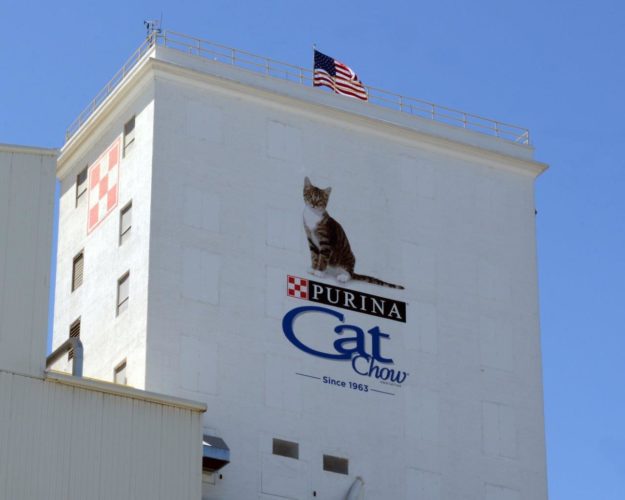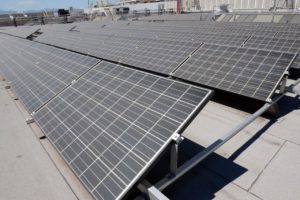Widgetized Section
Go to Admin » Appearance » Widgets » and move Gabfire Widget: Social into that MastheadOverlay zone
Denver’s Purina pet-food plant a model of sustainable manufacturing on I-70

The iconic Purina plant in north Denver (Purina photo).
There’s a palpable sense of pride when talking to Nestlé Purina engineering manager Tom Rotunno about the north Denver factory where he’s worked for the past two decades – the iconic pet food facility right off Interstate 70 at 4555 York St.

The first solar-powered pet food factory in the country (Purina photo).
Rotunno, a Colorado State University product, immediately launches into the fact that the Purina plant was the first-ever solar-powered pet-food factory, that it sends exactly zero waste to local landfills, that just last year it donated 230,000 pounds of pet food to local animal shelters and that it’s one of the most efficient and technologically advanced pet-food factories in the world.
“It’s kind of like my baby now,” Rotunno says of the factory that rises up in the foreground of Denver’s downtown vista for anyone passing through on I-70 – its vivid red-and-white checkerboard logo a symbol of Mile High City manufacturing productivity since 1930.
Rotunno started out as an engineering assistant, then progressed up through the ranks as a staff engineer, then senior staff engineer, and now he heads the engineering department. All told he’s been involved in construction and equipment throughout the plant for 20 years.
“There’s a true spirit of innovation here,” Rotunno said. “We use some of the most high-tech equipment at any processing facility in the world, and I think that’s sometimes lost on people when they come to visit the plant. They’re surprised at how much technology we actually have.”
The Denver facility, part of a network of 20 Purina factories across the United States, employs 280 people making a wide variety of dry dog- and cat-food brands. It receives ingredients by train and truck from all over the U.S., including locally sourced meat and grains from Colorado.
Rotunno says pet health is the plant’s top focus, with a team of Purina veterinarians on site at the Denver plant – a group that also works closely with CSU’s veterinary program. No animals are actually slaughtered in the production process at the Denver factory, he adds.
“We get our meats and grains and vegetables from the same places that human food comes from, so it’s the same factories that send us meats and vegetables,” Rotunno said. “The meats either come frozen solid in blocks or we get dried meat meal.”
But like any proud papa, if you tell Rotunno that his baby is a little smelly, he takes it to heart. As iconic as Purina’s factory is, so too is the odor that wafts through passing car windows and nearby neighborhoods. Dry ingredients are mixed with wet ingredients to form a dough that is then cooked and shaped in an extruder before being dried in large dryers.
“Air and heat goes through it, so that’s the smell,” Rotunno said. “If you made dog treats at home, it’s the same way you’d be able to smell those.”
To deal with the odor, which drew some negative press in recent years during the debate over marijuana odor ordinances, Purina installed a first round of tech several years ago called cyclonic separators to filter out the small particles that carried the most odors from the dryers.
“We put those in a couple of years ago and we saw a substantial decrease in odors from that,” Rotunno said. “Then round two that we’re doing now is actually large units that go on our exhaust points that actually address organic molecules. We put a lot of money into that technology; it takes a lot to buy and install and maintain.”
Stefano Casadei, Nestlé Purina’s plant manager for the Denver facility, is relatively new to the operation having taken over this past spring. But the Italian native who grew up in London already senses the staff pride and the plant’s place in the community.
“Part of us being a good neighbor is we needed to listen to our local communities and some of the complaints that we had in the past, and so we spent a significant amount and we put together a solid strategy to do odor abatement,” Casadei said.
“There is obviously a strong pride within the Denver factory — a strong pride of ownership from our employees and there is a strong passion for what we do here,” he added. “We strive to be the best, and we want to be the best place to work in Denver.”
Casadei says that sense of place in the community will be challenged in the coming years with the reconstruction of the I-70 viaduct.
“It shouldn’t have impact on our operations,” Casadei said. “Obviously, we’re working closely with the project leaders. We’re very close [to I-70], and obviously as a result of being very close we need to take some precautions, but we’re working very closely with the local community.”
David O. Williams
Latest posts by David O. Williams (see all)
- Neguse, Bennet call for halt to BLM emergency rule aimed at increasing Utah oil-train traffic - June 23, 2025
- The O. Zone: Trump’s long list of broken campaign promises just jumped to yet another forever war - June 23, 2025
- The O. Zone: Coming to Vail this summer? Leave fireworks, risky fire behavior at home - June 20, 2025



Six Mercer
September 12, 2019 at 10:42 am
I have driven past this factory for many of my 45 years as a Denver native and I have always struggled with ghe thought about what happens inside. You hear about horse meat being dog food and I was a very highly decorated equestrian for 25 years.I am so happy you wrote this article. I never wanted to support Purina because of the negative thoughts it always brought on for me, so my dogs eat expensive premium dog food. A vet told me Purina is as good if not better than the food I pay more than double for. Learning about the solar power and the lack of waste they produce and their determination to do what’s best for not only the pets who eat the food, but the shelters with donations, the community to work on the odor which I have noticed a tremendous decrease in, and the environment. Way to go Purina. Now I feel like saving money buyong your dogfood is not only good for me, but for my dogs, the community and the environment. I was also thrilled to finally learn you don’t butcher animals there, that you get everything from where our food comes from (not mine, I’m vegan lol). Thank you for your amazing concern for how you do business there. I’m sure your employees are very proud.